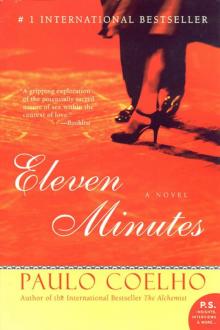- Home
- Paulo Coelho
The Fifth Mountain Page 3
The Fifth Mountain Read online
Page 3
“And, if it has something to say, I must listen. Because I have no one else with whom to speak,” continued Elijah.
In his imagination Elijah was transformed into the crow.
“What it is that God expects of you?” he asked himself, as if he were the crow.
“He expects me to be a prophet.”
“This is what the priests said. But it may not be what God desires.”
“Yes, it is what He wants. An angel appeared to me in my shop and asked me to speak with Ahab. The voices I heard as a child—”
“Everyone hears voices as a child,” interrupted the crow.
“But not everyone sees an angel,” Elijah said.
This time the crow did not reply. After an interval, the bird—or rather, his own soul, delirious from the sun and loneliness of the desert—broke the silence.
“Do you remember the woman who used to make bread?” he asked himself.
ELIJAH REMEMBERED. She had come to ask him to make some trays. While Elijah was doing as she asked, he heard her say that her work was a way of expressing the presence of God.
“From the way you make the trays, I can see that you have the same feeling,” she had continued. “Because you smile as you work.”
The woman divided human beings into two groups: those who took joy in, and those who complained about, what they did. The latter affirmed that the curse cast upon Adam by God was the only truth: “Cursed is the ground for thy sake; in sorrow shalt thou eat of it all the days of thy life.” They took no pleasure in work and were annoyed on feast days, when they were obliged to rest. They used the Lord’s words as an excuse for their futile lives, forgetting that He had also said to Moses: “For the Lord shall greatly bless thee in the land which the Lord thy God giveth thee for an inheritance to possess it.”
“Yes, I remember the woman. She was right; I did enjoy my work in the carpentry shop. She taught me to talk to things.”
“If you had not worked as a carpenter, you would not have been able to place your soul outside yourself, to pretend that it is a crow talking, and to understand that you are better and wiser than you believe,” came the reply. “Because it was in the carpentry shop that you discovered the sacred that is in all things.”
“I always took pleasure in pretending to talk to the tables and chairs I built; wasn’t that enough? And when I spoke to them, I usually found thoughts that had never entered my head. The woman had told me that it was because I had put the greater part of my soul into the work, and it was this part that answered me.
“But when I was beginning to understand that I could serve God in this way, the angel appeared, and—well, you know the rest.”
“The angel appeared because you were ready,” replied the crow.
“I was a good carpenter.”
“It was part of your apprenticeship. When a man journeys toward his destiny, often he is obliged to change paths. At other times, the forces around him are too powerful and he is compelled to lay aside his courage and yield. All this is part of the apprenticeship.”
Elijah listened attentively to what his soul was saying.
“But no one can lose sight of what he desires. Even if there are moments when he believes the world and the others are stronger. The secret is this: do not surrender.”
“I never thought of being a prophet,” Elijah said.
“You did, but you were convinced that it was impossible. Or that it was dangerous. Or that it was unthinkable.”
Elijah rose.
“Why do you tell me what I have no wish to hear?”
Startled at the movement, the bird fled.
THE BIRD RETURNED the next morning. Instead of resuming the conversation, Elijah began to observe it, for the animal always managed to feed itself and always brought him the food that remained.
A mysterious friendship developed between the pair, and Elijah began to learn from the bird. Observing it, he saw that it managed to find food in the desert, and he discovered that he could survive for a few more days if he learned to do the same. When the crow’s flight turned into a circle, Elijah knew there was prey at hand; he would run to the spot and try to catch it. At first, many of the small animals living there escaped, but he gradually acquired the skill and agility to capture them. He used branches as spears and dug traps, which he disguised with a fine layer of twigs and sand. When the quarry fell, Elijah would divide his food with the crow, then set aside part to use as bait.
But the solitude in which he found himself was terrible and oppressive, which is why he decided again to pretend he was conversing with the crow.
“Who are you?” asked the crow.
“I’m a man who has found peace,” replied Elijah. “I can live in the desert, provide for myself, and contemplate the endless beauty of God’s creation. I have discovered that there resides in me a soul better than ever I thought.”
They continued hunting together for another moon. Then one night when his soul was possessed by sorrow, he asked himself again, “Who are you?”
“I don’t know.”
ANOTHER MOON DIED and was reborn in the sky. Elijah felt that his body was stronger, his mind more clear. Tonight he turned to the crow, who was perched on the same branch as always, and answered the question he had asked some days before.
“I am a prophet. I saw an angel as I worked, and I cannot doubt what I am capable of doing, even if the entire world should tell me the opposite. I brought about a massacre in my country by challenging the one closest to the king’s heart. I’m in the desert, as before I was in a carpentry shop, because my soul told me that a man must go through various stages before he can fulfill his destiny.”
“Yes, and now you know who you are,” commented the crow.
That night, when Elijah returned from the hunt, he went to drink and found that the Cherith had dried up. But he was so weary that he decided to sleep.
In his dream, his guardian angel, whom he had not seen for a long time, came to him.
“The angel of the Lord hath spoken to thy soul,” said the guardian angel. “And hath ordered:
“Get thee hence, and turn thee eastward, and hide thyself by the brook Cherith, that is before Jordan.
“Thou shalt drink of the brook; and I have commanded the ravens to feed thee there.”
“My soul has heard,” said Elijah in the dream.
“Then awake, for the angel of the Lord biddeth me hence and is desirous of speaking to thee.”
Elijah leapt up, startled. What had happened?
Although it was night, the place was filled with light, and the angel of the Lord appeared.
“What hath brought thee here?” asked the angel.
“You brought me here.”
“No. Jezebel and her soldiers caused thee to flee. This must thou never forget, for thy mission is to avenge the Lord thy God.”
“I am a prophet, because you are in my presence and I hear your voice,” Elijah said. “I have changed paths several times, as do all men. But I am ready to go to Samaria and destroy Jezebel.”
“Thou hast found thy way, but thou mayest not destroy until thou learnest to build anew. I order thee:
“Arise, get thee to Zarephath, which belongeth to Sidon, and dwell there; behold, I have commanded a widow woman there to sustain thee.”
The next morning, Elijah looked for the crow, to bid him farewell. The bird, for the first time since he had arrived at the bank of the Cherith, did not appear.
ELIJAH JOURNEYED FOR DAYS BEFORE ARRIVING IN THE valley where lay the city of Zarephath, which its inhabitants knew as Akbar. When he was at the end of his strength, he saw a woman, dressed in black, gathering wood. The vegetation in the valley was sparse, and she had to be content with small, dry twigs.
“Who are you?” he asked.
The woman looked at the foreigner, not really understanding what he was saying.
“Bring me water to drink,” Elijah said. “Bring me also a piece of bread.”
The woman
put aside the wood but still said nothing.
“Do not be afraid,” Elijah insisted. “I am alone, hungry and thirsty, and haven’t the strength to harm anyone.”
“You’re not from here,” she said finally. “By the way you speak, you must be from the kingdom of Israel. If you knew me better, you’d be aware that I have nothing.”
“You are a widow; this the Lord has told me. And I have even less than you. If you do not give me food and drink now, I will die.”
The woman was taken aback; how could this foreigner know of her life?
“A man should feel shame at asking sustenance from a woman,” she said, recovering.
“Do as I ask, please,” Elijah insisted, knowing that his strength was beginning to fail. “When I am better, I will work for you.”
The woman laughed.
“Moments ago, you told me something true; I am a widow, who lost her husband on one of my country’s ships. I have never seen the ocean but I know it is like the desert: it slays those who challenge it…”
And she continued. “But now you tell me something false. As surely as Baal lives at the top of the Fifth Mountain, I have no food; there is nothing but a handful of flour in a barrel and a bit of oil in a flagon.”
Elijah saw the horizon changing direction and knew he was about to faint. Gathering the last of his strength, he implored one final time, “I don’t know if you believe in dreams; I don’t know even if I believe in them. But the Lord told me that I would arrive here, and that I would find you. He has done things that caused me to doubt His wisdom, but never His existence. And thus the God of Israel asked that I tell the woman I met in Zarephath:
“The barrel of meal shall not waste, neither shall the cruse of oil fail, until the day the Lord sendeth rain upon the earth.”
Without explaining how such a miracle could come about, Elijah fainted.
The woman stood gazing down at the man who lay at her feet. She knew that the God of Israel was a mere superstition; the Phoenician gods were more powerful, and they had made her country one of the most respected nations on earth. But she was happy; usually she had to ask others for alms, and now, as had not happened for a long time, a man needed her. This made her feel stronger, for it was manifest that there were those in worse circumstances than she.
“If someone asks a favor of me, it is because I still have some use on this earth,” she reflected.
“I’ll do as he asks, if only to relieve his suffering. I too have known hunger, and know its power to destroy the soul.”
She went to her house and returned with a piece of bread and some water. She kneeled, placed the foreigner’s head in her lap, and began to moisten his lips. Within a few minutes, he had regained his senses.
She held out the bread to him, and Elijah ate quietly, looking at the valley, the ravines, the mountains pointing silently heavenward. Elijah could see the reddish walls of the city of Zarephath dominating the passage through the valley.
“Give me lodging with you, for I am persecuted in my own country,” Elijah said.
“What crime have you committed?” she asked.
“I’m a prophet of the Lord. Jezebel has ordered the death of all who refuse to worship the Phoenician gods.”
“How old are you?”
“Twenty-three,” Elijah replied.
She looked pityingly at the young man before her. He had long, dirty hair and a beard that was still sparse, as if he wished to appear older than his years. How could a poor fellow like this challenge the most powerful princess in the world?
“If you’re Jezebel’s enemy, you’re my enemy too. She is a princess of Tyre, whose mission when she married your king was to convert your people to the true faith, or so say those who have met her.”
She pointed toward one of the peaks that framed the valley.
“Our gods have lived on the Fifth Mountain for many generations, and they have kept peace in our country. But Israel lives in war and suffering. How can you go on believing in the One God? Give Jezebel time to carry out her work and you’ll see that peace will reign in your cities too.”
“I have heard the voice of the Lord,” Elijah replied. “But your people have never climbed to the top of the Fifth Mountain to discover what exists there.”
“Anyone who climbs the Fifth Mountain will die from the fire of the heavens. The gods don’t like strangers.”
She fell silent. She had remembered dreaming, the night before, of a very strong light. From the midst of that light came a voice saying: “Receive the stranger who comes seeking you.”
“Give me lodging with you, for I have nowhere to sleep,” Elijah insisted.
“I told you that I’m poor. I barely have enough for myself and my son.”
“The Lord asked you to let me stay; He never abandons those He loves. Do what I ask of you. I will work for you. I’m a carpenter, I know how to work cedar; there will be no lack of something to do. This way, the Lord will use my hands to keep His promise: The barrel of meal shall not waste, neither shall the cruse of oil fail, until the day the Lord sendeth rain upon the earth.”
“Even if I wished to, I would have no way to pay you.”
“There is no need. The Lord will provide.”
Confused by the previous night’s dream, and even with the knowledge that the stranger was an enemy of the princess of Tyre, the woman decided to obey.
ELIJAH’S PRESENCE WAS SOON NOTICED BY THE NEIGHBORS. People commented that the widow had taken a foreigner into her house, in disrespect of the memory of her husband—a hero who had died attempting to expand his country’s trade routes.
When she heard the rumors, the widow explained that he was an Israelite prophet, weary from hunger and thirst. And word spread that an Israelite prophet in flight from Jezebel was hiding in the city. A delegation went to see the high priest.
“Bring the foreigner to my presence,” he ordered.
And it was done. That afternoon, Elijah was led to the man who, together with the governor and the leader of the military, controlled all that took place in Akbar.
“What have you come here to do?” he asked. “Do you not know that you are our country’s enemy?”
“For years I have had commerce with Lebanon, and I respect your people and their customs. I am here because I am persecuted in Israel.”
“I know the reason,” said the high priest. “Was it a woman who made you flee?”
“In all my life, that woman was the most beautiful creature I have ever met, though I stood before her for only a brief moment. But her heart is like stone, and behind those green eyes hides the enemy who wishes to destroy my country. I did not flee; I await only the right moment to return.”
The high priest laughed.
“If you’re waiting for the right moment to return, prepare yourself to remain in Akbar for the rest of your life. We are not at war with your country; all we desire is to see the spread of the true faith, by peaceful means, throughout the world. We have no wish to repeat the atrocities committed by your people when you installed yourselves in Canaan.”
“Is killing prophets a peaceful means?”
“If you cut off a monster’s head, it ceases to exist. A few may die, but religious wars will be averted forever. And, from what the traders tell me, it was a prophet named Elijah who started all this, then fled.”
The high priest stared at him, before continuing.
“A man who looked much like you.”
“It is I,” Elijah replied.
“Excellent. Welcome to the city of Akbar; when we need something from Jezebel, we will pay for it with your head—the most important currency we have. Till then, seek out employment and learn to fend for yourself, because here there is no place for prophets.”
Elijah was preparing to depart, when the high priest told him, “It seems that a young woman from Sidon is more powerful than your One God. She succeeded in erecting an altar to Baal, before which the old priests now kneel.”
“Everything
will happen as was written by the Lord,” replied the prophet. “There are moments when tribulations occur in our lives, and we cannot avoid them. But they are there for some reason.”
“What reason?”
“That is a question we cannot answer before, or even during, the trials. Only when we have overcome them do we understand why they were there.”
AS SOON AS ELIJAH had departed, the high priest called the delegation of citizens who had sought him out that morning.
“Do not concern yourselves about this,” said the high priest. “Custom mandates that we offer hospitality to foreigners. Besides that, here he is under our control and we can observe his steps. The best way to know and destroy an enemy is to pretend to become his friend. When the time comes, he will be handed over to Jezebel, and our city will receive gold and other recompense. By then, we shall have learned how to destroy his ideas; for now, we know only how to destroy his body.”
Although Elijah was a worshiper of the One God and a potential enemy of the princess, the high priest demanded that the right of asylum be honored. Everyone knew of the ancient custom: if a city were to deny shelter to a traveler, the sons of its inhabitants would later face the same difficulty. Since the greater part of Akbar had descendants scattered among the country’s gigantic merchant fleet, no one dared challenge the law of hospitality.
Furthermore, it cost nothing to await the day when the Jewish prophet’s head would be exchanged for large amounts of gold.
That night, Elijah supped with the widow and her son. As the Israelite prophet was now a valuable commodity to be bargained for in the future, several traders sent provisions enough to feed the three of them for a week.
“It appears the God of Israel is keeping His word,” said the widow. “Not since my husband died has my table been as full as today.”
LITTLE BY LITTLE ELIJAH BECAME PART OF THE LIFE OF Zarephath and, like all its inhabitants, came to call it Akbar. He met the governor, the commander of the garrison, the high priest, and the master glassmakers, who were admired throughout the region. When asked his reason for being there, he would tell the truth: Jezebel was slaying all the prophets in Israel.

 The Alchemist
The Alchemist Maktub
Maktub Like the Flowing River
Like the Flowing River The Winner Stands Alone
The Winner Stands Alone The Spy
The Spy By the River Piedra I Sat Down and Wept: A Novel of Forgiveness
By the River Piedra I Sat Down and Wept: A Novel of Forgiveness Eleven Minutes
Eleven Minutes Manuscript Found in Accra
Manuscript Found in Accra Warrior of the Light
Warrior of the Light Veronika Decides to Die: A Novel of Redemption
Veronika Decides to Die: A Novel of Redemption The Devil and Miss Prym: A Novel of Temptation
The Devil and Miss Prym: A Novel of Temptation The Valkyries: An Encounter With Angels
The Valkyries: An Encounter With Angels Brida: A Novel
Brida: A Novel Fifth Mountain: A Novel
Fifth Mountain: A Novel Adultery
Adultery Inspirations
Inspirations The Archer
The Archer The Witch of Portobello
The Witch of Portobello The Pilgrimage
The Pilgrimage The Zahir
The Zahir Brida
Brida The Fifth Mountain
The Fifth Mountain Like the Flowing River: Thoughts and Reflections
Like the Flowing River: Thoughts and Reflections Manual of the Warrior of Light
Manual of the Warrior of Light By The River Piedra I Sat Down & Wept
By The River Piedra I Sat Down & Wept The Supreme Gift
The Supreme Gift Aleph
Aleph Hippie
Hippie Witch of Portobello
Witch of Portobello The Devil and Miss Prym
The Devil and Miss Prym The Alchemist - 10th Anniversary Edition
The Alchemist - 10th Anniversary Edition The Valkyries
The Valkyries